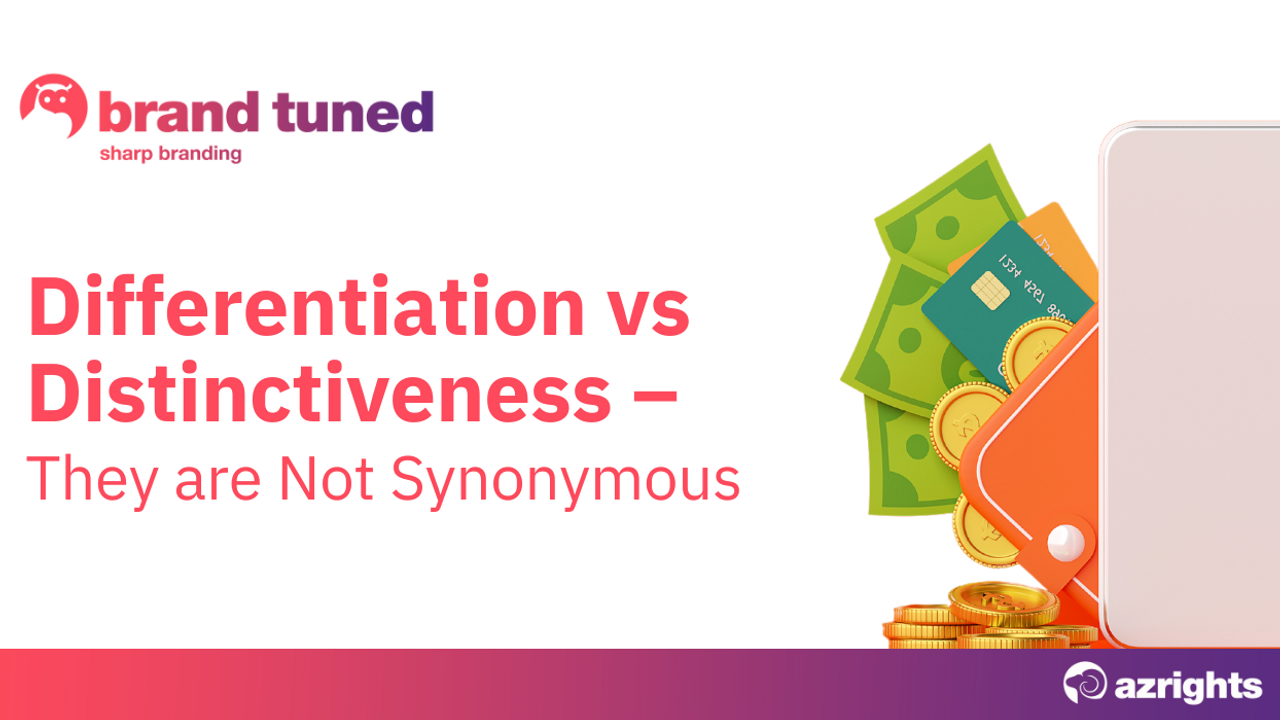Differentiation vs Distinctiveness – They are Not Synonymous
Jul 12, 2022
It's naïve not to see the danger that competitors pose in business.
The more lucrative an ‘untouched’ area of business is, the more you should expect extreme competition to quickly follow after you launch your business.
For example, CurrencyFair had an innovative business model when it introduced its peer-to-peer money transferring services. People could transact globally at a fraction of the costs that banks were charging. However, Transferwise (now Wise) TransferGo and WeSwap soon emerged to also benefit from the opportunity. They are examples of how when a market is buoyant, competitors quickly follow.
While intellectual property can’t protect you against those who copy your business model what it does protect is a brand’s distinctiveness. Unfortunately, distinctiveness is often overlooked or not properly addressed because people assume differentiation and distinctiveness mean the same thing.
Distinctiveness has a different focus. It’s all about your choice of name, logo, symbols, tagline, music, and colours that uniquely identify you (although don’t put too much reliance on colour because it is difficult to uniquely own a colour).
To create a truly distinctive brand it helps to understand intellectual property and brand protection. Ownership of brand assets is key to having a brand that is inimitable and unique. Your distinctiveness is how you stand out in your category and are recognised and remembered. Your target customers know it’s you thanks to your name and unique look and feel. With distinctiveness you can stop ‘me too’ competitors copying you long after they’ve copied your differentiation.
With differentiation the focus is on ensuring your brand is perceived as different to competitors. It might be different because of its unique business model or for offering features and benefits that your competitors can’t or won’t offer or because you have patented technology, trade secrets or other IP rights that underpin your differentiation.
However, differentiation only gives you a short-term advantage even where your legally protected IP underpins that differentiation, such as where you have a patent. Your patent will expire so doesn’t fend off competitors long-term. Often competitors will copy you so quickly you barely have time to benefit from your differentiation strategy. So, it’s essential to put the accent on distinctiveness when you create a brand so you can use the relatively short window of opportunity that your differentiation gives you to become known and recognisable.
Let me give you an example. Windsurfing International had a patent over the windsurfer which made it hugely successful until its patent was invalidated by competitors. They found prior art in the form of a newspaper article that pre-dated its patent application. The article featured a picture of a young boy with a board combined with a sail which used a universal joint, one of the key parts of Windsurfing International's patent. This invalidated the company’s patent.
Unfortunately, the company was using the utterly banal, generic name ‘Windsurfer’ rather than a proper brand name. The name lacked distinctiveness. Had the company chosen its branding with distinctiveness as an uppermost consideration then their protected IP would have given them patent like protection after they lost their patent because their windsurfers would have been associated with their brand name. As it was, the company’s huge success thanks to its patent was largely wasted because distinctiveness was overlooked.
As Seth Godin says of competition in Purple Cow ‘Why do birds fly in formation? Because the birds that follow the leader have an easier flight. The leader breaks the wind’s resistance, and the following birds can fly far more efficiently.’
If you have a breakthrough idea, you should expect others to sooner or later copy you. They will benefit from the fact that you’ve shown them the way forward. They may well be able to implement the idea better than you did and become the market leader.
Pay close attention to your distinctive branding. Don’t try to find meaning in your choices of name and identifiers. Understand what distinctiveness really involves, and double down on it so you can properly benefit from what uniquely differentiated you.
If you think about it, when you remember a brand such as Nike, what comes to mind is the company’s name, its swoosh logo and its tagline Just do it. I personally don’t have a clue how Nike differs from Adidas or any of its other competitors. From this it should be clear that distinctiveness lasts, while differentiation doesn’t.
Distinctiveness involves creating intellectual property that’s legally protectable. Nike’s trademark in its name, tagline and logo can be renewed forever as long as the company continues to use them. These IP rights contain the value of the Nike brand.
So much emphasis has been placed on differentiation and finding meaning in brand names and other identifiers that distinctiveness is often overlooked. Very weak names are chosen, and the visual identity is invariably nothing more than a stylised word mark in a particular colour. What’s worse, often this identity is treated as something that can radically change every so often, such as when the brand strategy is revisited, or a new website is built. Such changes are believed to be positive, when in fact they disturb memory structures that people have built up and make the brand unrecognisable.
Learning to create distinctive brands that stand out involves properly understanding IP. Sign up to my Brand Tuned Accreditation program and learn how to use IP strategically.
To create truly distinctive brands that stand the test of time involves learning more about how IP impacts differentiation and distinctiveness.
Nothing will differentiate you more as a designer or marketer than a proper understanding of the role of IP and brand protection in brand creation, so join my Brand Tuned Accreditation program today. It’s the last day of the early bird half price offer.

